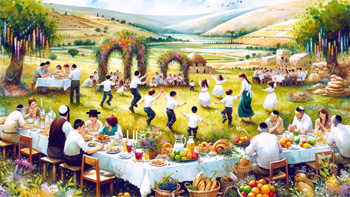 Shavuot in Israel
Shavuot in Israel


Shavuot, also known as the Feast of Weeks, is a significant Jewish festival celebrated in Israel and by Jewish communities worldwide. This holiday, rich in history and tradition, marks the wheat harvest in the Land of Israel and commemorates the anniversary of the day God gave the Torah to the nation of Israel assembled at Mount Sinai. It is celebrated on the sixth day of the Hebrew month of Sivan, which usually falls in late May or early June. Shavuot is not just a historical commemoration but also a vibrant and dynamic festival, deeply rooted in both agricultural and spiritual significance.
The festival of Shavuot is unique as it links the physical act of harvest with the spiritual act of receiving the Torah. This dual significance makes Shavuot a time of thanksgiving as well as a time of spiritual renewal and commitment. In Israel, where the holiday is a public holiday, the celebration of Shavuot takes on a special character, blending religious observances with cultural events, reflecting the diverse nature of Israeli society.
The Agricultural Aspect of Shavuot
In ancient times, Shavuot was primarily an agricultural festival, marking the end of the spring barley harvest and the beginning of the summer wheat harvest. In the Temple in Jerusalem, the first fruits of the harvest were offered to God, a practice that symbolized gratitude and dependence on divine providence. Today, while the Temple no longer stands, the agricultural aspect of the festival is still celebrated in Israel. Many kibbutzim and moshavim (agricultural communities) host events such as parades of tractors and farm equipment, adorned with flowers and produce. These celebrations often include singing, dancing, and the reading of poems and biblical passages related to agriculture and harvest.
Children in schools and pre-schools across Israel participate in ceremonies and performances, wearing white shirts and crowns made of leaves and flowers. They sing songs about the harvest and the giving of the Torah, bridging the ancient and modern aspects of the holiday. The use of dairy products is also a distinctive feature of Shavuot, with many Israelis enjoying cheesecake, blintzes, and other dairy delicacies, possibly reflecting the land of Israel as a land flowing with milk and honey.
Religious Observances on Shavuot
Shavuot is also a time of religious and spiritual significance. It commemorates the day the Torah was given to the Israelites at Mount Sinai, a pivotal event in Jewish history. Religious Jews observe this aspect of the holiday by engaging in all-night study sessions known as Tikkun Leil Shavuot. These sessions typically involve reading from the Torah, the Prophets, and the Talmud, as well as discussing religious texts and singing songs. In synagogues throughout Israel, the Book of Ruth is read, symbolizing loyalty and devotion to God and the Jewish people. The story of Ruth, who gleaned in the fields and later converted to Judaism, also ties in with the agricultural aspect of the holiday.
Another tradition is the decoration of homes and synagogues with greenery and flowers, symbolizing the lushness of the harvest and the revelation at Mount Sinai, where the mountain was said to have bloomed with flowers. This practice adds a festive and joyful atmosphere to the holiday, filling spaces with color and life.
Community and Cultural Celebrations
Shavuot in Israel is not only marked by religious and agricultural traditions but is also a time for community gatherings and cultural events. In cities and towns across the country, concerts, lectures, and public readings are organized, many of which are free and open to the public. These events often feature discussions on topics related to Jewish history, culture, and identity, reflecting the diverse nature of Israeli society.
Another aspect of Shavuot in Israel is the embracing of different Jewish traditions from around the world. Since Israel is a melting pot of cultures, with Jews from Europe, Africa, the Middle East, and the Americas, Shavuot becomes a tapestry of customs and practices. This diversity is evident in the food, music, and rituals that are part of the holiday's celebration, offering a unique and rich experience for both locals and visitors.
Shavuot for Children and Families
Shavuot is also a family-centered holiday in Israel. Many families take this opportunity to spend time together, whether in religious observance, participating in cultural events, or enjoying the outdoors. Museums, parks, and nature reserves often host family-friendly activities, including workshops, guided tours, and storytelling sessions. These activities provide a fun and educational way for children to learn about the holiday's significance and traditions.
For many Israeli families, preparing and sharing meals is an important part of celebrating Shavuot. The emphasis on dairy products leads to the creation of festive meals featuring an array of cheeses, yogurts, and milk-based desserts. Families gather to enjoy traditional dishes like cheesecakes, quiches, and kugels, often incorporating fresh fruits and vegetables from the spring harvest. This culinary tradition not only reflects the agricultural roots of the holiday but also provides a moment for family bonding and the creation of lasting memories.
In essence, Shavuot is a multifaceted holiday that holds a deep significance for the Jewish people, especially in Israel. It seamlessly blends the historical and spiritual aspects of Judaism with the practical and joyous celebration of the harvest. Whether through the religious study, agricultural festivities, cultural events, or family gatherings, Shavuot offers an opportunity for reflection, thanksgiving, and renewal. The diverse customs and traditions observed during this festival showcase the rich tapestry of Jewish life and the enduring connection to both land and faith. As such, Shavuot remains a vital and vibrant celebration in the Jewish calendar, continuing to inspire and unite communities in Israel and around the world.